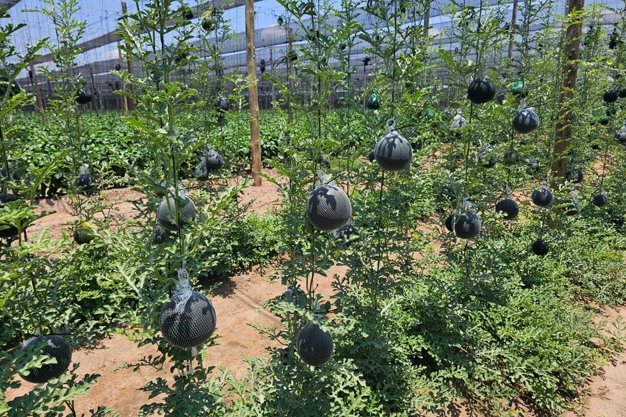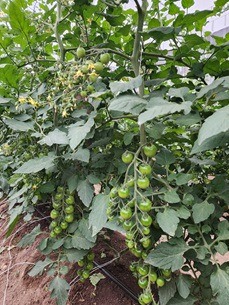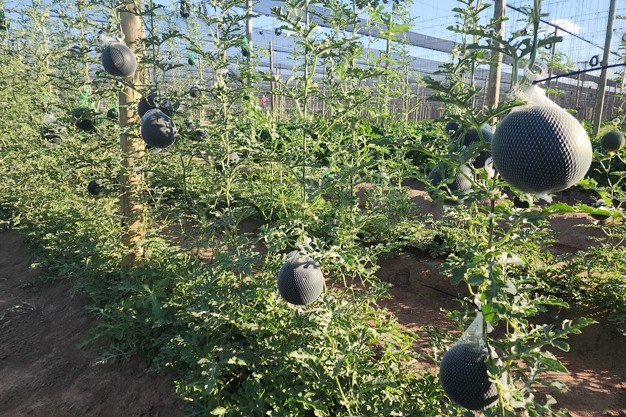Francois Fourie believes in precision agriculture: he applies the principles himself in growing vegetables (and this season fruit too) while his company Turf Technology & Irrigation (TT-i) sets up irrigation and fertigation systems across South Africa.
"In 2016 Turf Technology & Irrigation set up a demo unit of tunnels with the goal of proving that precision fertigation and irrigation scheduling could ensure any crop is grown to its optimum," Fourie says, and to market TTI's integrated technical services, as well as to apply the principles in practice, a Polokwane-based venture called CAPCU Farming was set up.
Since they've already been growing Rijk Zwaan's pepper and cucumber varieties, CAPCU Farming was a logical choice when Woolworths obtained the sole license to market Rijk Zwaan's miniature Candy Ball watermelons and Caribbean Smile melons in South Africa.
This will be CAPCU Farming's first foray into growing fruit: the dainty Candy Ball seedless watermelons weigh between a kilogram and 1.5kg; Caribbean Smile melons are even smaller at 800g to 1kg.
They're approaching them in the way they do their cucumbers: the melon plants are trellised – Fourie says he's sure they are the only ones in South Africa to be growing melons that way. The first store rollouts are planned for early-December, so currently it's all hands on deck with Woolworths' technical team to make sure it comes off without hitch.
 Francois Fourie says these are probably the only melons grown suspended in South Africa
Francois Fourie says these are probably the only melons grown suspended in South Africa
Peak cucumber season coming up
CAPCU is among South Africa's small group of cucumber growers, and on the itinerary during a recent tour of northern cucumber farms by Cape growers. Their experiences in growing cucumbers were shared and Rijk Zwaan technical advisors from Spain gave a presentation on cucumber rootstocks.
As in Spain, almost all South African cucumber production occurs undercover. Fourie offers a reminder that it is a tropical crop which needs to be protected from temperatures below 14°C in winter to continue production.
CAPCU Farming's cucumbers are supplied to Freshmark, mostly for their Limpopo stores while at times, when needed, cucumbers are sent south to replenish Gauteng stores. Extra cucumbers are sent to the Gauteng and Durban municipal markets or sold through online platform Nile.
December is a peak cucumber season, followed by a second smaller winter cucumber harvest.
On the farm, sugar beans, carrots, cocktail tomatoes and peppers are also grown. "We aim for a healthy balance between retail and the municipal markets. We certainly do not consider the markets as an avenue for our lower grade products. It's important to pack high quality product in our branded packaging, whether it's destined for our retail clients or for the municipal markets."
Tightrope between chemicals and biologicals "We try to apply rotation cropping principles under shade nets. Like just about everyone else, we also use beneficial insects and biological products. You can't not use them these days - even those who don't buy into a biological view, are using products like mating disruption and pheromone traps."
"We try to apply rotation cropping principles under shade nets. Like just about everyone else, we also use beneficial insects and biological products. You can't not use them these days - even those who don't buy into a biological view, are using products like mating disruption and pheromone traps."
Right: growing tomatoes for the first time
Some tricks work well, he says, like planting Tagetes outside the greenhouse to lure thrips away. The flowers are sometimes black, encrusted with thrips which are controlled hard on the flowers. This allows them room to apply 'softer' chemicals on the greenhouse vegetables whose residue levels will be tested.
But since biological products like beneficial organisms are living entities, whether they survive and thrive in a production block is extremely context-dependent and season-dependent.
"The thing is," he continues, "the chemical products that we're still allowed to use are becoming fewer. Among those they're taking away are some that have been working well for us. That pushes everyone in a corner."
Their further dilemma is that there is not (yet?) an alternative and registered biological weapon as replacement of every chemical one.
He expresses his anxiety about resistance building to the few extant chemical products left to the industry. Losing a wider variety of fungicides and pesticides is for him, as vegetable farmer, of particular concern.
Pest pressure increases as the summer marches on, and they've never yet succeeded in going it all the way to the end with only biologicals, he says, but every season they start with that intention. Certainly, he says, farms are spraying less than twenty, thirty years ago.
"You've just got to come up with new plans, so that if more active ingredients are taken away, you're not caught unawares but can proactively prepare for it."

2010 Soccer World Cup kicked it all off
Fourie grew up on a Limpopo farm, studied soil science and plant production, but it was the 2010 Soccer World Cup that set him and a partner on their way through the national lottery support for rural sports facility development in the years leading to the sport event, hence their name Turf Technology.
By 2011, TTi's entrance into precision irrigation and fertigation systems in greenhouses (they found the field of openland irrigation already well-served by others) coincided with the nascent boom in blueberries and a stupendous demand for their services in setting up blueberry tunnels and undercover blocks. "I really enjoyed working on blueberry turnkey projects," he says, but never himself ventured into blueberry production.
The irrigation side of things, in turn, led to the establishment of their own vegetable production business unit, CAPCU Farming, another product of the 2010 World Cup from someone who believes in converting every opportunity. For more information:
For more information:
Francois Fourie
CAPCU Farming & Turf Technology Irrigation
Tel: +27 83 626 6573
Email: info@tt-i.co.za
https://tt-i.co.za/
